Status Updates
April, 2022
April 29, 2022
CORE TECHNOLOGY
This week, the node and consensus teams prepared Ouroboros for the Vasil hard fork upcoming in June. The teams continued working on the UTXO HD performance properties along with diffusion pipelining tests and benchmarking.
An important update has taken place - the block size has been increased from 80KB to 88KB to allow more transactions and scripts in one block.
The networking team worked on IOSim timeout API benchmarking, found and fixed a bug in the mock implementation of the DNS query component, and finalized the development of the DNS recoverability test.
Finally, the team continued working on the typed protocols’ refactoring and the Gossip protocol design.
WALLETS AND SERVICES
This week, the Daedalus team tested and integrated the new cardano-node v.1.34.1 with Daedalus, and fixed and tested some Windows issues related to Ledger hardware wallets. The team is now working on the basic architecture of the new desktop wallet.
The Adrestia team prepared a big update for the cardano-wallet, including the introduction of a "Light" mode, addition of token minting and burning, fee minimization, coin selection refactoring, DB refactoring, and bug fixing.
The team is also working on adding multisig features and redesigning the DB layer.
Finally, they also continued working on the cardano-js-sdk.
SMART CONTRACTS
This week, the Plutus team spent time working on dependencies and fixed some bugs, improved the start time for Nix, and made incremental updates to the documentation. Finally, they added initial support for SECP256k1 verification.
The Marlowe team ran their first Marlowe contract on mainnet. They also added WalletCompanion testing capability, support for bech32 formats, and transaction metadata to the marlowe-cli framework. Issues with failed wallet refunds were also addressed.
Within the Marlowe Playground, they added time input slots and resolved some issues. Also, a new loading indicator display feature was added when restoring or creating a new wallet in Marlowe Run.
BASHO (SCALING)
This week, the Hydra team completed work on the feature enabling rollbacks handling and published relevant documentation on the Hydra website. They also improved Hydra Heads properties in terms of funds safety, and continued working on transaction benchmarking as part of a move to use proper multi-signatures.
GOVERNANCE
This week, Project Catalyst is entering its final voting phase with only a week left to cast votes on over 1,000 proposals. Once all voting is in, the results will be tallied and shared the following week. Hundreds of successful projects are going to be onboarded soon.
Fund9 will open in early June - users are encouraged to get involved early. In the meantime, users can register for the Town Hall meet-ups or watch this week’s recording here.
STATISTICS TO DATE
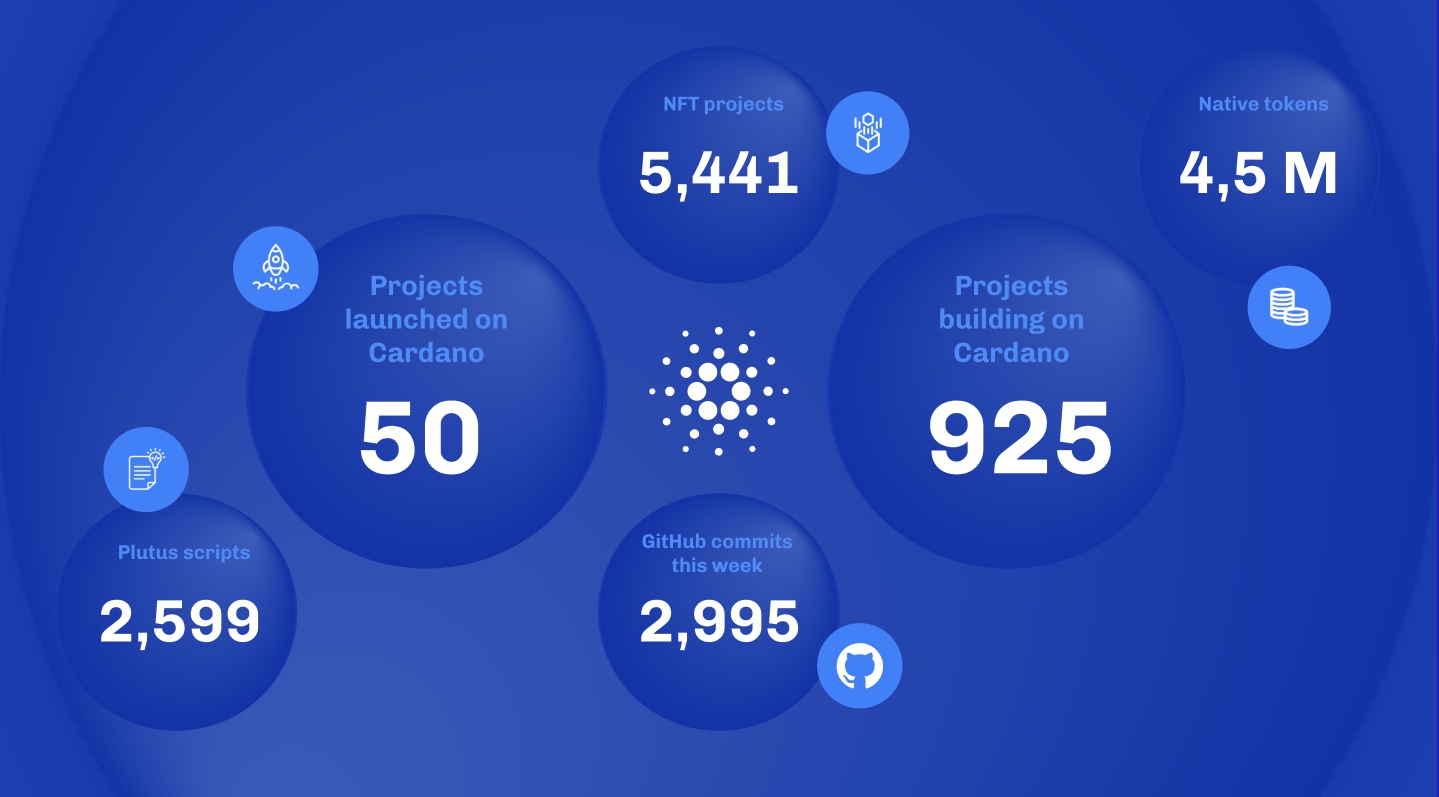
April 21, 2022
CORE TECHNOLOGY
This week, the node and consensus teams continued preparations for June’s Vasil hard fork, working on both Cardano node and Plutus improvements. A 10% block size increase is expected as part of Cardano mainnet continuous improvements. The team also fixed some bugs while working on pipelining, and synchronized a node running UTXO HD with the Alonzo era, using the in-memory backend.
The networking team continued working on IOSim properties and typed protocols refactoring, which impacts the overall framework for writing networking protocols. This will also simplify the further development of Gossip and Eclipse protocols.
WALLETS AND SERVICES
The Daedalus team continued building a proof of concept for the desktop wallet using UI components of the light wallet. They also made progress working on a performance increase in the stake pool list, improving the usability of the mnemonic entry when restoring or creating a new wallet, and creating an Apple Silicon native version of Daedalus.
The Adrestia team continued working on the addition of token minting and burning to the transaction flow, DB layer redesign, cardano-wallet ‘light’ mode addition, and cardano-js-sdk MVP.
BASHO (SCALING)
This week, the Hydra team added functionality to the Hydra node that enables it to start following the chain at a point in the past and recover from possible shutdowns or issues. They also continued working on the handling of chain rollbacks.
GOVERNANCE
This week, Project Catalyst Fund8 entered its voting stage for ada holders to vote on a variety of projects. Users who missed the voting snapshot can get involved in Project Catalyst Fund9, which launches in early June.
STATISTICS TO DATE
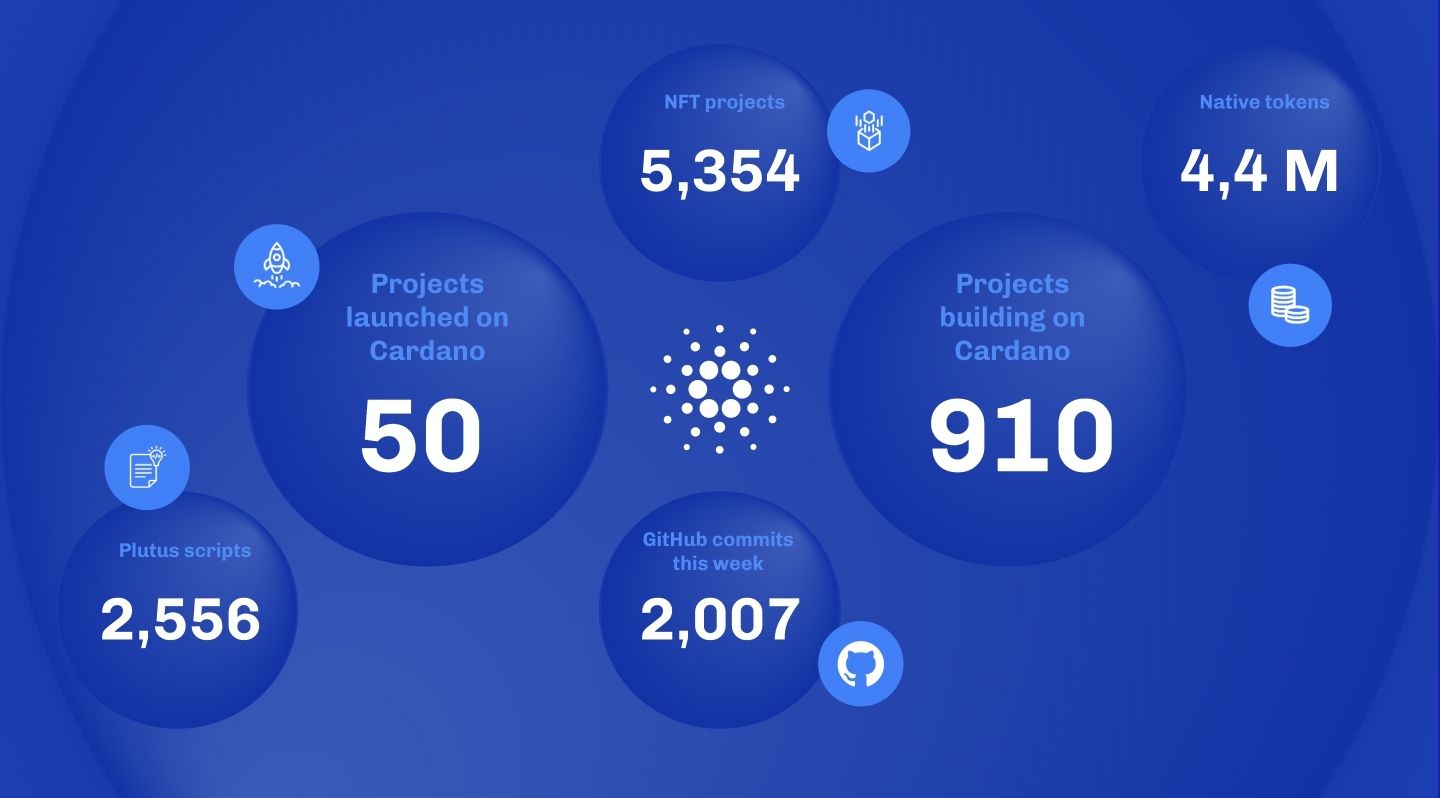
April 14, 2022
CORE TECHNOLOGY
This week, the team continued working on the block diffusion pipelining and node performance improvements. They also ran property tests for UTXO HD and fixed several errors. They are now working on refining and adapting more tests, refactoring the code to accommodate the fixes, and assessing the performance of the in-memory backend. April’s mid-month development update is going live on Thursday (April, 14th), featuring the latest progress on ledger development.
The networking team reviewed node-to-node and node-to-client protocol versions and removed obsolete ones. They updated the cardano-ping mini-protocol to support available versions and continued working on IOSim timeouts and typed-protocols refactorization.
They also identified (and designed a fix for) a security issue within IPv6 deployments and communicated it to the SPO community. Finally, the team continued working on the design of the Gossip Protocol and Eclipse Evasion, which will drive forward a more robust and decentralized P2P network.
WALLETS AND SERVICES
This week, the Daedalus team released Daedalus v.4.9.1. They also updated some packages and resolved several vulnerability issues. The team converted the Daedalus Nix infrastructure to use Nix Flakes, which assures compatibility with the cardano-wallet, and also migrated the Daedalus project to Webpack 5, allowing for faster reload when coding new features. They also polished the analytics integration to be used in future versions of Daedalus, and fixed a bug to allow for the correct deletion of the Daedalus installer file after the upgrade.
The Adrestia team continued working on a new transaction workflow to add token minting and burning, and also worked on DB layer redesign and the addition of a ‘light’ mode to cardano-wallet. Finally, work is still ongoing on cardano-js-sdk MVP.
SMART CONTRACTS
This week, the Plutus team continued working on Plutus Cardano Improvement Proposals (CIPs) and updated documentation. They also made improvements to the chain index and updated the contract model tutorial within Plutus apps.
The Marlowe team added test support for contract timeouts, fixed some duplicated contract cards, and added unit testing to the front-end execution model. They also fixed the contract carousel in the Marlowe dashboard when reopening and deployed a copy of Cardano Explorer that points to the testnet. Finally, the team made several changes to contracts to correctly reflect balances and metadata.
BASHO (SCALING)
The Hydra team worked on measuring script cost execution of the various on-chain scripts driving the Hydra protocol. A new command-line option was also added to the Hydra node to allow starting a Head from a point in the past - previously, Hydra nodes would only start from the most recent chain tip. This gives ways for users to restart their Hydra node and recover some state in the past if needed.
The team also worked to provide more resilience to chain forks (e.g. due to on-chain slot battles). Information on the blockchain is only eventually immutable and because of the distributed nature of the protocol, recent information received from a node may be overridden non-predictably. DApps such as Hydra must therefore acknowledge those changes and react accordingly to maintain an internally consistent state.
GOVERNANCE
Fund8 is entering its voting stage next Thursday (21st April), where ada holders will vote on hundreds of projects ranging from big to small, spanning dozens of countries.
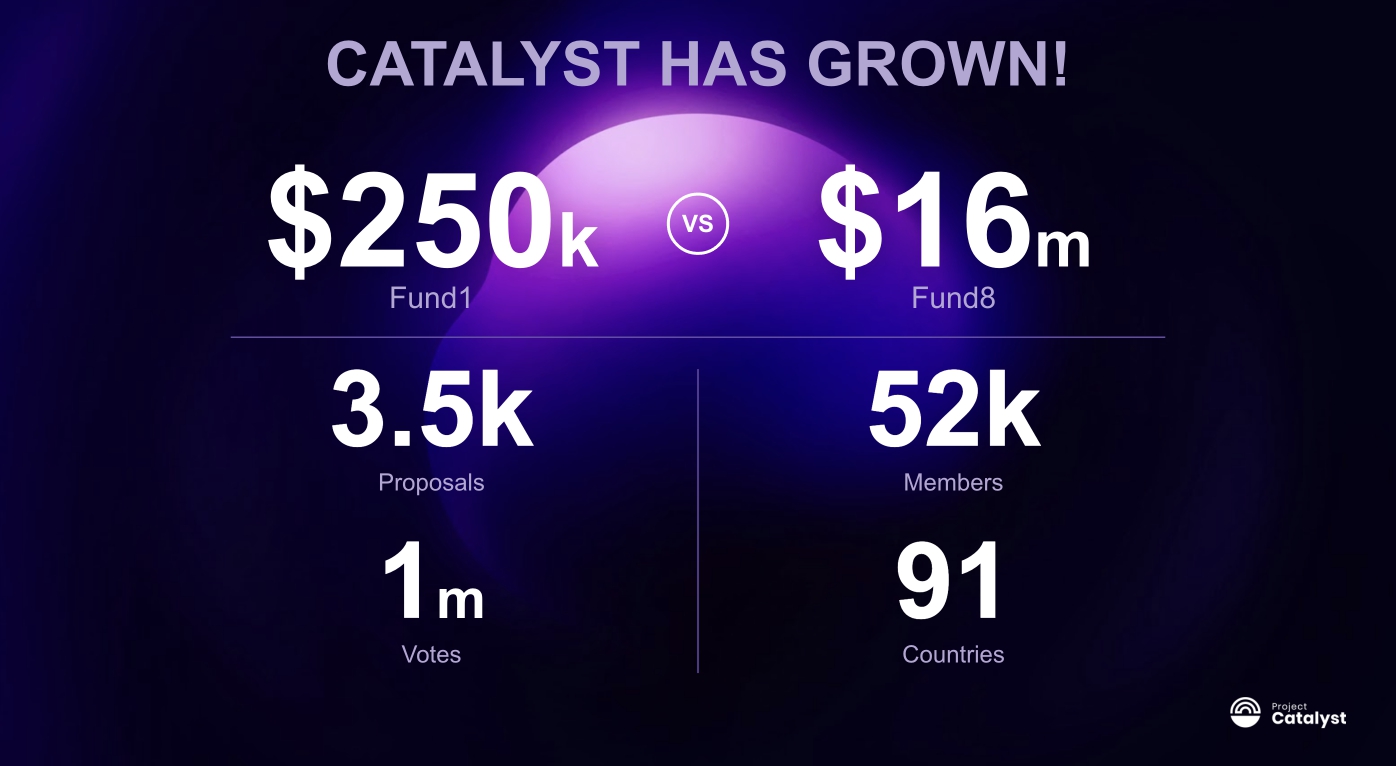
Applications to join the first cohort of dReps reopened and will stay open for a further week. Starting in early May, the team will be hosting a series of workshops to share and discuss what it means to be a dRep and how it will work. The first cohort will be delegation pioneers. Users can register their interest now by joining the first dRep cohort or find out more details in the recent blog post.
STATISTICS TO DATE
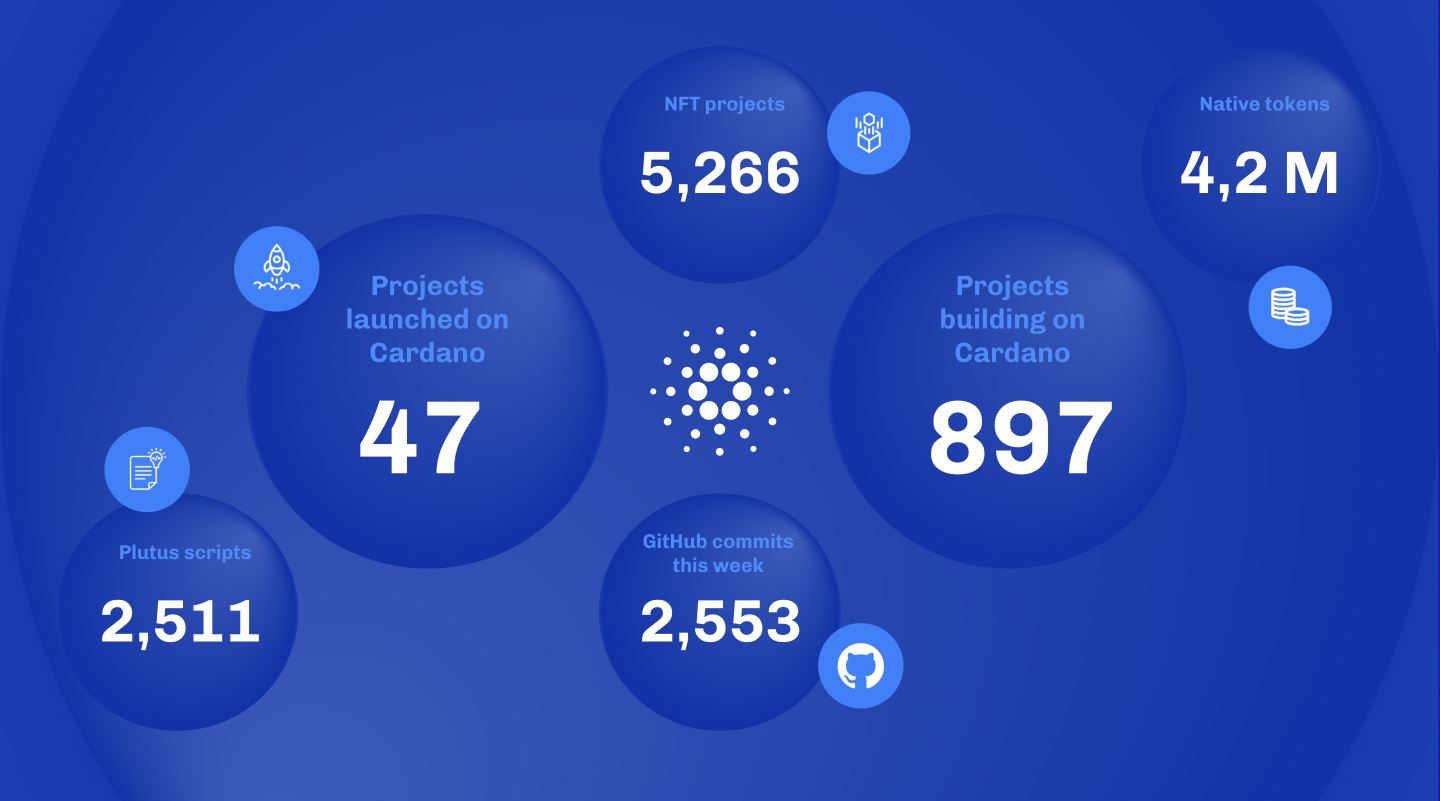
April 8, 2022
CORE TECHNOLOGY
This week, the team finalized the pipelining MVP in the Ouroboros consensus repository. They also inspected some memory consumption properties along with hard fork combinator functionality in regards to UTXO HD and updated two important sets of tests for UTXO HD, which include golden tests for ledger tables and ledger DB. The team are now assessing the tests to decide which to include for the MVP.
Finally, they continued preparing for the Vasil hard fork in June, focusing on the implementation of node v.1.35 and the Gossip protocol.
The networking team finalized the performance analysis of IOSim and IOSimPOR and continued working on the reimplementation of timers in IOSim. They worked on IOSim timeouts API refactoring and optimization to improve network diffusion tests, and continued rewriting typed protocols. The team also updated all networking components to ouroboros-network-framework resolving some issues that occurred.
WALLETS AND SERVICES
This week, the Daedalus team integrated the new cardano-ledger-js library that allows communication with the latest cardano-ledger-app, and are now running compatibility tests. The team also started implementing changes to the signing process for sending tokens with the latest cardano-ledger-js. They improved the ‘momoto’ integration in Daedalus, which simplifies the understanding of the application usage, and worked on the strategy on how to reuse common components with the mono-repository.
There is progress on the light wallet development - a ‘one-stop-shop’ for all blockchain operations. The engineering and QA teams worked on the front-end and back-end improvements, aiming for code freeze by the first week of May. They are now focused on improving core wallet features, including sending and receiving assets, funds staking, the NFT gallery, hardware wallet ledger support, DApp connector, and transaction history. The next big features coming in are identity, voting center, learn center, DEX, and sidechains. Every new version will add granular improvements to the UI/UX.
As the team progresses with light wallet testing, they are reaching out to internal and external users to try out light wallet functionality and share their feedback.
The Adrestia team continued working on a new transaction workflow to add token minting and burning, and also worked on DB layer redesign and the addition of a ‘light’ mode to cardano-wallet. Finally, work is still ongoing on cardano-js-sdk MVP.
SMART CONTRACTS
This week, the Plutus team worked on benchmarking results and improving chain index performance. They also updated parsers to accept text rather than bytestring and added customizable unlifting that propagates all the way up to `EvaluationContext’ which now has two sets of parameters.
The Marlowe team added integration testing for the create contract flow and investigated which platform to use for error reporting and log aggregation. They made updates to ensure all global errors are logged in Marlowe Run and updated the CI script of the Marlowe repository to work with Isabelle2021 formats. They also added some new accessibility attributes to user interface elements in the Marlowe Playground.
Additionally, they fixed issues where the contract action showed the wrong review dialog as well as a problem that caused a card to hang when a contract action failed.
GOVERNANCE
In less than a year, Project Catalyst has become the world’s largest decentralized innovation fund. It is a focal point for ongoing development and sustainable innovation, driven by the Cardano community. Fund8 had nearly 1,000 proposals put forward, and Catalyst is now on track to fund over 2,100 proposals during 2022. That is staggering!
Fund8 is entering its voting stage this week, where ada holders will vote on hundreds of incredible projects ranging from big to small, spanning dozens of countries. It’s the largest fund to date ($16m) and continues to demonstrate how community-driven innovation can flourish.
Aside from Fund8, invitations are being reopened to join the first cohort of Delegate Representatives (dReps). The introduction of dReps is another exciting step forward as the community continues to learn and grow. There will be more to share and discuss over the weeks and months ahead as we roll out delegation into future Project Catalyst funds. To bolster inclusion and diversity, we are reopening interest in joining the first dRep cohort.
STATISTICS TO DATE
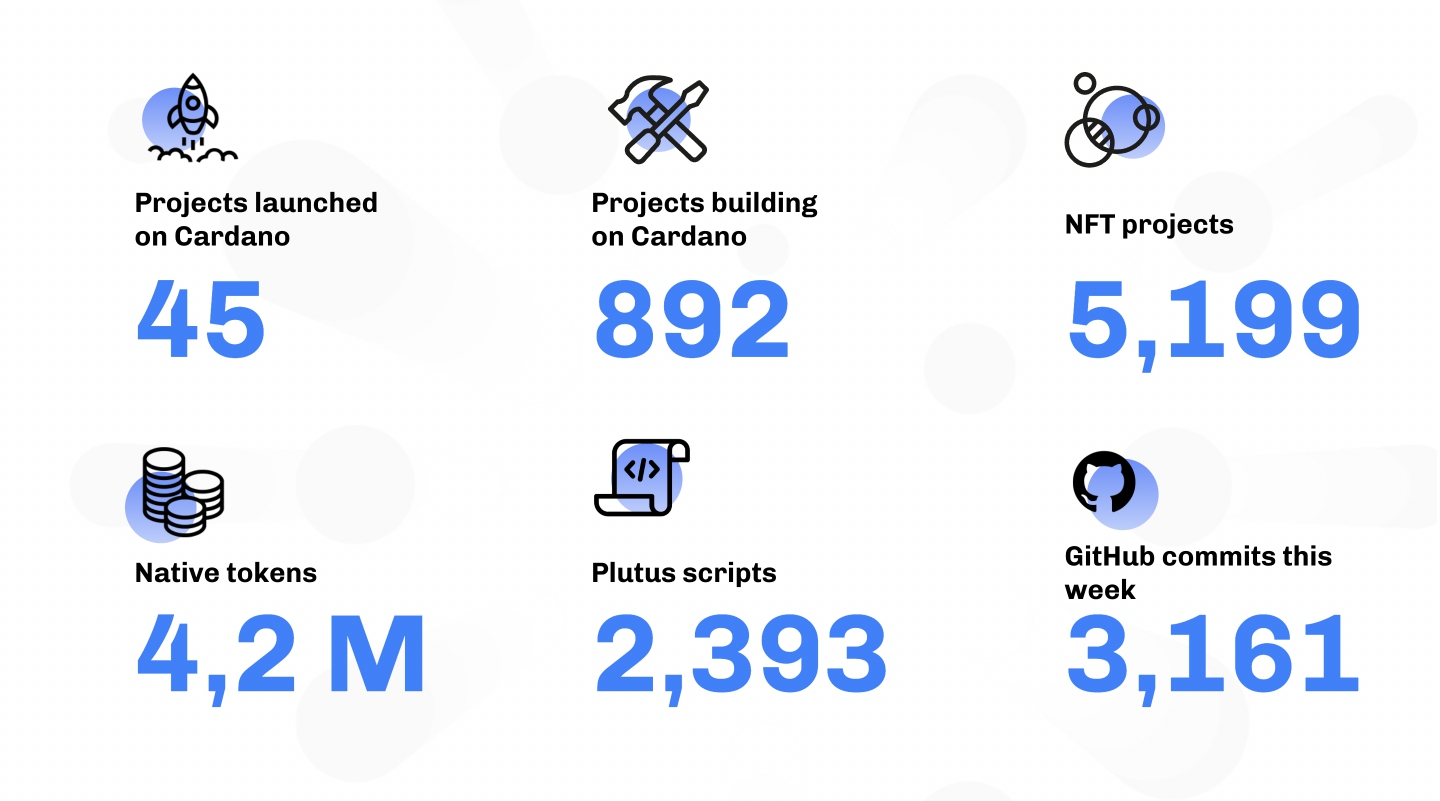
April 1, 2022
DAEDALUS
This week, the team worked on hardware wallets integration improvements, updates, and bug fixes. The team is also finalizing the implementation of magic links and integrating an open-source user analytics solution.
Finally, the team made various user-interface improvements and fixed some bugs.
ADRESTIA
This week, the team continued working on a new transaction workflow to add token minting and burning, and also worked on DB layer redesign and adding a ‘light’ mode in cardano-wallet.
Finally, work is still ongoing on cardano-js-sdk MVP.
DEVOPS
This week, the team deployed IPv6 to the public testnet. They also created artifacts that can be used by Windows CI checks to validate functionality with the same binaries used for releases.
Also, the team created and fully tested Cardano Bitte Cell, which allows the node, wallet and db-sync to be run in a Nomad cluster, and enabled OCI image generation for Bitte Cells. The latter allows Cardano components to be utilized in container-based solutions such as Nomad and Kubernetes.
The team also made the vector OCI image usable for Bitte to push structured logs to Loki, and Prometheus metrics to Victoria. They defined standardization on deployment procedures utilizing Nix, Bitte, and STD, created Spongix - a proxy that acts as binary cache for Nix, and worked on Patroni Bitte Cell to provide a high-availability PostgreSQL database.
NETWORKING
This week, the team worked on the implementation of IOSim timeout primitives and inspected the performance optimization of IOSim achieving a 10% improvement. They also continued working on the rewriting of typed protocols.
CARDANO DECENTRALIZATION
This week, the team prepared the first draft of the pipelining implementation. They created a private integration branch and are now working on improvements and quality assurance. The team also fixed the Shelley transition error on the UTXO HD branch, and audited existing consensus tests against UTXO HD modifications.
CIPs for reference inputs (CIP-31), inline datum (CIP-32), and reference scripts (CIP-33) have all been submitted to be implemented on Cardano. The team have recently defined the Babbage rules for their implementation and are now working on some issues resolution.
GOGUEN
This week, the Plutus team worked on the first iteration of the certification framework. They also did some refactoring work and simplified query functions in the benchmarks. Finally, they continued progress on updates for CIP 31, 32, and 33 and improved documentation around the area of common pitfalls and weaknesses for DApp developers.
The Marlowe team investigated the possibility of introducing transactional multi-currency payments into Marlowe. They also added queries to the Marlowe CLI for deserializing script EUTXOs and updated Isabelle proofs about serialization to work with Isabelle2021 formats.